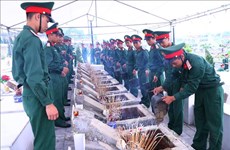Exploitation threatens herb medicine plants
Herbs used in traditional Vietnamese medicine may be lost completely
unless measures are taken to manage their cultivation and exploitation.
Herbs used in traditional Vietnamese medicine may be lost completely
unless measures are taken to manage their cultivation and exploitation.
Head of the Traditional Medicine Department Pham Vu Khanh said that people were over-farming them without any thoughts of replanting seedlings for the future.
"The situation has put these herbs at risk and some rare varieties may face extinction," said Khanh.
Having traded in traditional medicine in the northern province of Cao Bang for a decade, Nong Van Vin agreed that business was bad because availability was low.
"I used to sell over 10 varieties of traditional herbal medicine, but since last year I've only had three in stock," Vin said.
Back in 2000, there was something of a traditional medicine boom, and many local people jumped on the bandwagon and sold medicinal plants they picked in the wild to traders.
However, this trend is declining, due to the lack of plants.
Khanh said poor awareness and greed were the main reasons for the problem, citing some people's desire for short-term gains and lack of thought for future generations.
"The way they exploit medicinal plants is unorganised and wasteful," Khanh furthered.
Doctor Tran Van On from the Hanoi Medical University blamed the situation on a casual lack of concern among authorities.
"Experts in oriental medicine have not highlighted the scarcity of medicinal plants or the benefits of preserving them," On said.
Doctor Tran Cong Khanh from the Centre for Research and Development of Ethno-medicinal Plants said the number of medicinal plants in Vietnam made up 19 percent of the total 20,000 known throughout the world.
That figure did not include several thousand plants used by ethnic people that scientists were unaware of, he added.
While crops are declining, demand for export is high.
Khanh said there was not enough being done to stop people from exporting herbal medicine in bulk.
Unclear regulations are also preventing forest rangers from punishing people who over-exploit the plants.
In most cases, they were only able to hand out minor punishments relevant to forest destruction crime, Khanh added.
Chairman of Cao Bang Oriental Medicine Association Nguyen Van Be said there were between five and 10 big herbal medicine shops as well as hundreds of smaller shops scattered throughout the province.
"None of them are licensed to trade in herbal medicine," he said.
According to experts, many clinics have started re-importing herbal medicine at lower cost and quality.
Khanh claimed that it was also the responsibility of the Ministry of Health to deal with the issue.
He said the Traditional Medicine Department would work with the ministry to devise a strategy for ethno-medicinal plant development.
As part of the strategy, provinces would be asked to build herbal medicine cultivation zones to preserve 40 medicinal plants essential for the domestic production of oriental medicine.
High-value herbal medicine would be exported in the long run, the draft said. /.
Head of the Traditional Medicine Department Pham Vu Khanh said that people were over-farming them without any thoughts of replanting seedlings for the future.
"The situation has put these herbs at risk and some rare varieties may face extinction," said Khanh.
Having traded in traditional medicine in the northern province of Cao Bang for a decade, Nong Van Vin agreed that business was bad because availability was low.
"I used to sell over 10 varieties of traditional herbal medicine, but since last year I've only had three in stock," Vin said.
Back in 2000, there was something of a traditional medicine boom, and many local people jumped on the bandwagon and sold medicinal plants they picked in the wild to traders.
However, this trend is declining, due to the lack of plants.
Khanh said poor awareness and greed were the main reasons for the problem, citing some people's desire for short-term gains and lack of thought for future generations.
"The way they exploit medicinal plants is unorganised and wasteful," Khanh furthered.
Doctor Tran Van On from the Hanoi Medical University blamed the situation on a casual lack of concern among authorities.
"Experts in oriental medicine have not highlighted the scarcity of medicinal plants or the benefits of preserving them," On said.
Doctor Tran Cong Khanh from the Centre for Research and Development of Ethno-medicinal Plants said the number of medicinal plants in Vietnam made up 19 percent of the total 20,000 known throughout the world.
That figure did not include several thousand plants used by ethnic people that scientists were unaware of, he added.
While crops are declining, demand for export is high.
Khanh said there was not enough being done to stop people from exporting herbal medicine in bulk.
Unclear regulations are also preventing forest rangers from punishing people who over-exploit the plants.
In most cases, they were only able to hand out minor punishments relevant to forest destruction crime, Khanh added.
Chairman of Cao Bang Oriental Medicine Association Nguyen Van Be said there were between five and 10 big herbal medicine shops as well as hundreds of smaller shops scattered throughout the province.
"None of them are licensed to trade in herbal medicine," he said.
According to experts, many clinics have started re-importing herbal medicine at lower cost and quality.
Khanh claimed that it was also the responsibility of the Ministry of Health to deal with the issue.
He said the Traditional Medicine Department would work with the ministry to devise a strategy for ethno-medicinal plant development.
As part of the strategy, provinces would be asked to build herbal medicine cultivation zones to preserve 40 medicinal plants essential for the domestic production of oriental medicine.
High-value herbal medicine would be exported in the long run, the draft said. /.













